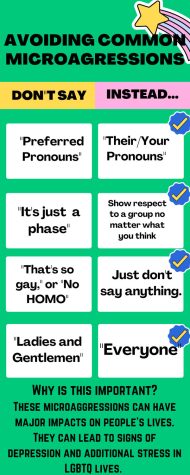Microaggressions
November 14, 2021

Believe it or not, people still say ŌĆ£thatŌĆÖs so gay.ŌĆØ Even if it is just a saying, these little phrases can negatively affect someone in the LGBTQ+ community. There are many ways to help and hurt the community. The way you phrase your sentences and the tone in which you say your words are vitally important to this community.┬Ā
Starting with genders, do not make assumptions. One of the ŌĆśjokesŌĆÖ that spread through our middle school classrooms directly impacted people of the LGBTQ community. Asking someone if they were assuming your gender produced little giggles throughout our seventh and eighth-grade classrooms, but this is a serious thing. Do not assume genders of peers, if you are unsure of someoneŌĆÖs pronouns, you should find a way to respectfully ask them which pronouns they use.┬Ā
When referring to someone’s pronouns, what you say can be hurtful to members of the LGBTQ+ community. For example, while interviewing and researching for this article, I would ask people what their preferred pronouns are for the purpose of the article. I quickly figured out that what I said was incorrect. A lot of people refer to a change in pronouns as ŌĆ£preferred pronouns,ŌĆØ and this can be considered as a microaggression because of the implication that the ŌĆśpreferred pronounsŌĆÖ arenŌĆÖt the ŌĆścorrectŌĆÖ pronouns. When I was saying ŌĆśpreferred pronouns,ŌĆÖ I wasnŌĆÖt purposely trying to sound passive-aggressive, I was just trying to communicate in a language I didnŌĆÖt fully understand.┬Ā
Someone may use different pronouns. For example, someone who is non-binary or gender fluid may use he/they pronouns. Normally, this means they are interchangeable, but it could also mean some days they feel more masculine and some days they feel more neutral on the gender spectrum. They can identify using different pronouns on different days, months, or across a span of years. Normally, during these pronoun changes, the person would tell you. However, if someone were to change their pronouns, it can be exhausting to tell each person they come across that they are changing their pronouns, so when communicating with someone who is non-binary or gender fluid, a way to ease that communication would be to every once and a while just ask them what pronouns they are currently using.┬Ā
It is also important to remember that the use of pronouns can also be based on how comfortable a person is in a specific setting or around certain people, so it is also important to ask when you can use specific pronouns. When people disclose their pronouns to you, it can be a good deal to them and you donŌĆÖt want to use specific pronouns around people they may not feel comfortable with.┬Ā
People in the LGBTQ+ community arenŌĆÖt asking you to be perfect. If you mess up on a name or pronoun, just apologize and correct yourself. If you are unsure, ask what they prefer. The common theme is respect.┬Ā
Getting ready for school, Gillies decided to wear a shirt that says: ŌĆ£Error: gender not found.ŌĆØ He said that he got weird looks and rude comments about the shirt. Gillies even felt like they needed to wear a hoodie over the shirt in the hallway. The bottom line is facial expressions can be microaggressions as well.┬Ā
ŌĆ£The discrimination sucks because thereŌĆÖs no reason for it,ŌĆØ Gillies said. ŌĆ£Just because people donŌĆÖt like things that are different doesnŌĆÖt mean that you shouldnŌĆÖt be respectful.ŌĆØ┬Ā
